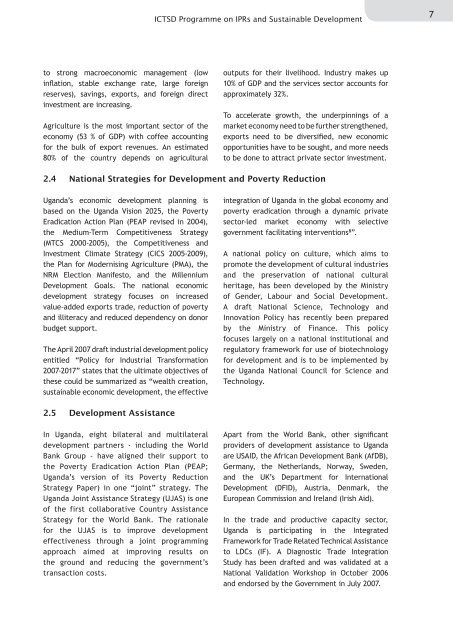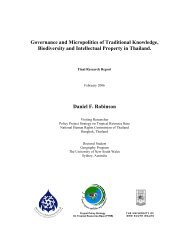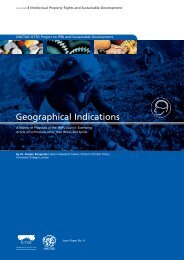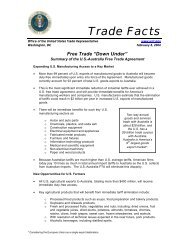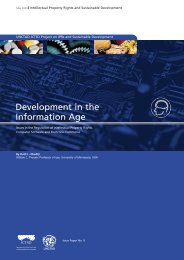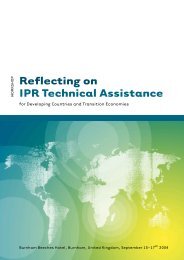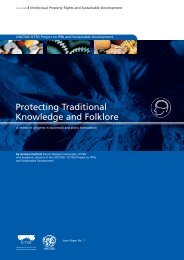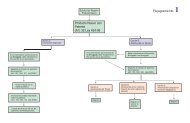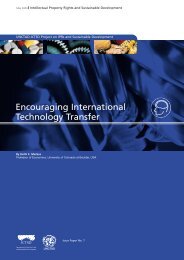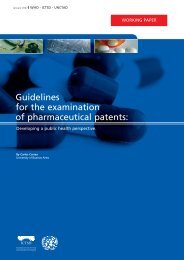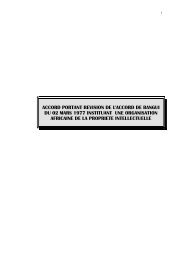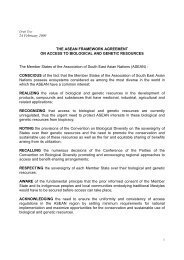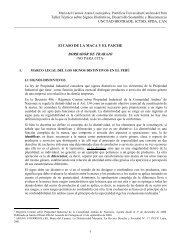Final Report of Uganda Intellectual Property ... - IPRsonline.org
Final Report of Uganda Intellectual Property ... - IPRsonline.org
Final Report of Uganda Intellectual Property ... - IPRsonline.org
You also want an ePaper? Increase the reach of your titles
YUMPU automatically turns print PDFs into web optimized ePapers that Google loves.
ICTSD Programme on IPRs and Sustainable Development<br />
7<br />
to strong macroeconomic management (low<br />
inflation, stable exchange rate, large foreign<br />
reserves), savings, exports, and foreign direct<br />
investment are increasing.<br />
Agriculture is the most important sector <strong>of</strong> the<br />
economy (53 % <strong>of</strong> GDP) with c<strong>of</strong>fee accounting<br />
for the bulk <strong>of</strong> export revenues. An estimated<br />
80% <strong>of</strong> the country depends on agricultural<br />
outputs for their livelihood. Industry makes up<br />
10% <strong>of</strong> GDP and the services sector accounts for<br />
approximately 32%.<br />
To accelerate growth, the underpinnings <strong>of</strong> a<br />
market economy need to be further strengthened,<br />
exports need to be diversified, new economic<br />
opportunities have to be sought, and more needs<br />
to be done to attract private sector investment.<br />
2.4 National Strategies for Development and Poverty Reduction<br />
<strong>Uganda</strong>’s economic development planning is<br />
based on the <strong>Uganda</strong> Vision 2025, the Poverty<br />
Eradication Action Plan (PEAP revised in 2004),<br />
the Medium-Term Competitiveness Strategy<br />
(MTCS 2000-2005), the Competitiveness and<br />
Investment Climate Strategy (CICS 2005-2009),<br />
the Plan for Modernising Agriculture (PMA), the<br />
NRM Election Manifesto, and the Millennium<br />
Development Goals. The national economic<br />
development strategy focuses on increased<br />
value-added exports trade, reduction <strong>of</strong> poverty<br />
and illiteracy and reduced dependency on donor<br />
budget support.<br />
The April 2007 draft industrial development policy<br />
entitled “Policy for Industrial Transformation<br />
2007-2017” states that the ultimate objectives <strong>of</strong><br />
these could be summarized as “wealth creation,<br />
sustainable economic development, the effective<br />
integration <strong>of</strong> <strong>Uganda</strong> in the global economy and<br />
poverty eradication through a dynamic private<br />
sector-led market economy with selective<br />
government facilitating interventions 8 ”.<br />
A national policy on culture, which aims to<br />
promote the development <strong>of</strong> cultural industries<br />
and the preservation <strong>of</strong> national cultural<br />
heritage, has been developed by the Ministry<br />
<strong>of</strong> Gender, Labour and Social Development.<br />
A draft National Science, Technology and<br />
Innovation Policy has recently been prepared<br />
by the Ministry <strong>of</strong> Finance. This policy<br />
focuses largely on a national institutional and<br />
regulatory framework for use <strong>of</strong> biotechnology<br />
for development and is to be implemented by<br />
the <strong>Uganda</strong> National Council for Science and<br />
Technology.<br />
2.5 Development Assistance<br />
In <strong>Uganda</strong>, eight bilateral and multilateral<br />
development partners - including the World<br />
Bank Group - have aligned their support to<br />
the Poverty Eradication Action Plan (PEAP;<br />
<strong>Uganda</strong>’s version <strong>of</strong> its Poverty Reduction<br />
Strategy Paper) in one “joint” strategy. The<br />
<strong>Uganda</strong> Joint Assistance Strategy (UJAS) is one<br />
<strong>of</strong> the first collaborative Country Assistance<br />
Strategy for the World Bank. The rationale<br />
for the UJAS is to improve development<br />
effectiveness through a joint programming<br />
approach aimed at improving results on<br />
the ground and reducing the government’s<br />
transaction costs.<br />
Apart from the World Bank, other significant<br />
providers <strong>of</strong> development assistance to <strong>Uganda</strong><br />
are USAID, the African Development Bank (AfDB),<br />
Germany, the Netherlands, Norway, Sweden,<br />
and the UK’s Department for International<br />
Development (DFID), Austria, Denmark, the<br />
European Commission and Ireland (Irish Aid).<br />
In the trade and productive capacity sector,<br />
<strong>Uganda</strong> is participating in the Integrated<br />
Framework for Trade Related Technical Assistance<br />
to LDCs (IF). A Diagnostic Trade Integration<br />
Study has been drafted and was validated at a<br />
National Validation Workshop in October 2006<br />
and endorsed by the Government in July 2007.


